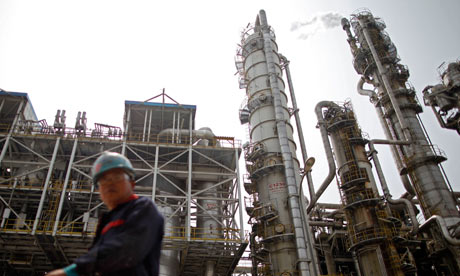An environmental group has accused China of climate blackmail after threats to vent powerful greenhouse gases if Europe cuts off carbon credits next year. The row over hydrofluorocarbon-23 offsets – which have a much greater warming effect than carbon dioxide and linger in the atmosphere for 200 years – has intensified before international climate negotiations in Durban this month.
Since 2005, Chinese firms have received the bulk of the $6bn in carbon credits for the reduction of these gases, which are produced in the manufacturing of refrigerant chemicals. The money has mostly come from European firms that have bought the offsets under the clean development mechanism, but this source of funding will come to an end next year. The EU has banned HFC-23 offsets because they are inefficient: the value of credits is 70 times the cost of destroying HFC-23 gases.
There are also widespread suspicions that Chinese and Korean firms have cynically created hydrofluorocarbon facilities in order to qualify for credits, which can generate twice as much income as selling the refrigerant. But Europe's decision has angered Chinese officials responsible for administering the system, which has generated $1.3bn in tax revenues for the state.
The China Clean Development Mechanism Fund warned last week that the loss of income would force HFC producers to cut costs. "If there's no trading of [HFC-23] credits, they'll stop incinerating the gases" said Xie Fei, the fund's revenue management director. His comments have sparked outrage among environmental groups.
"Attempting to force countries into squandering billions on fake offsets that actually increase production of greenhouse gases is extortion," said Samuel LaBudde, senior atmospheric campaigner with the Environmental Investigation Agency. "China is not the victim here, and a world order responsive to climate change cannot be predicated on unrepentant greed." The NGO accuses China of blocking international efforts to find alternative means of dealing with these potent industrial emissions, including direct payments to factories and technological and financial support for other developing nations to dispose of the gases. Xie Fei declined to comment on these allegations.







